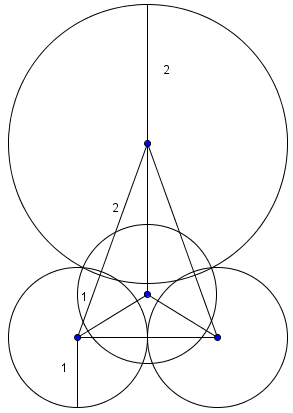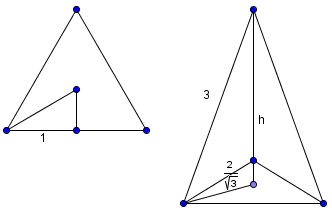Difference between revisions of "2004 AMC 12A Problems/Problem 22"
(+ spacing, imgs. Somebody should do a readibility check) |
m (heh, I had forgotten the initial reason behind my edit) |
||
| Line 1: | Line 1: | ||
| + | {{duplicate|[[2004 AMC 12A Problems|2004 AMC 12A #22]] and [[2004 AMC 10A Problems/Problem 25|2004 AMC 10A #25]]}} | ||
| + | |||
== Problem == | == Problem == | ||
Three mutually [[tangent]] [[sphere]]s of [[radius]] <math>1</math> rest on a horizontal [[plane]]. A sphere of radius <math>2</math> rests on them. What is the [[distance]] from the plane to the top of the larger sphere? | Three mutually [[tangent]] [[sphere]]s of [[radius]] <math>1</math> rest on a horizontal [[plane]]. A sphere of radius <math>2</math> rests on them. What is the [[distance]] from the plane to the top of the larger sphere? | ||
| Line 15: | Line 17: | ||
== See also == | == See also == | ||
{{AMC12 box|year=2004|ab=A|num-b=21|num-a=23}} | {{AMC12 box|year=2004|ab=A|num-b=21|num-a=23}} | ||
| + | {{AMC10 box|year=2004|ab=A|num-b=24|after=Final Question}} | ||
| − | [[Category: | + | [[Category:Introductory Geometry Problems]] |
Revision as of 16:22, 4 December 2007
- The following problem is from both the 2004 AMC 12A #22 and 2004 AMC 10A #25, so both problems redirect to this page.
Problem
Three mutually tangent spheres of radius ![]() rest on a horizontal plane. A sphere of radius
rest on a horizontal plane. A sphere of radius ![]() rests on them. What is the distance from the plane to the top of the larger sphere?
rests on them. What is the distance from the plane to the top of the larger sphere?
![]()
Solution
The height from the center of the bottom sphere to the plane is ![]() , and from the center of the top sphere to the tip is
, and from the center of the top sphere to the tip is ![]() . We now need the vertical height of the centers. If we connect the centers, we get a triangular pyramid with an equilateral triangle base. The distance from the vertex of the equilateral triangle to its centroid can be found by
. We now need the vertical height of the centers. If we connect the centers, we get a triangular pyramid with an equilateral triangle base. The distance from the vertex of the equilateral triangle to its centroid can be found by ![]() s to be
s to be ![]() .
.
By the Pythagorean Theorem, we have ![]() . Adding the heights up, we get
. Adding the heights up, we get ![]() .
.
See also
| 2004 AMC 12A (Problems • Answer Key • Resources) | |
| Preceded by Problem 21 |
Followed by Problem 23 |
| 1 • 2 • 3 • 4 • 5 • 6 • 7 • 8 • 9 • 10 • 11 • 12 • 13 • 14 • 15 • 16 • 17 • 18 • 19 • 20 • 21 • 22 • 23 • 24 • 25 | |
| All AMC 12 Problems and Solutions | |
| 2004 AMC 10A (Problems • Answer Key • Resources) | ||
| Preceded by Problem 24 |
Followed by Final Question | |
| 1 • 2 • 3 • 4 • 5 • 6 • 7 • 8 • 9 • 10 • 11 • 12 • 13 • 14 • 15 • 16 • 17 • 18 • 19 • 20 • 21 • 22 • 23 • 24 • 25 | ||
| All AMC 10 Problems and Solutions | ||











